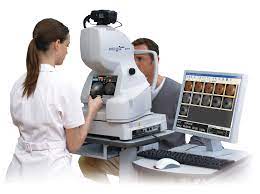DIAGNOSTICS Both Eye OCT
India
-
Our Price USD 89
-
Hospital Price USD 94
-
You Save : USD 5
Booking Amount: USD 9. Pay Remaining 90% at the hospital.
Book NowAdditional Credit
Among the important extras we offer as part of the Additional Credit are the following:
-
Site Tourism For The Patient & Attendant
-
Airport Pick & Drop Service
-
Ambulance service at airport
-
Priority appointments with The Doctor
-
Cancel Easily Anytime with Full Refund
-
Room Upgradation
-
Free Online Doctor Consultation Valued at USD 20
-
Free hotel Stay for 5 to 7 days Accordingly
-
Welcome Kit at Arrival
-
Interpreter
-
Medical Visa Assistance
What is Included?
- Doctor consultation charges
- Lab tests and diagnostic charges
- Room charges inside hospital during the procedure
- Surgeon Fee
- Cost of implant
- Nursing charges
- Hospital surgery suite charges
- Anesthesia charges
- Routine medicines and routine consumables (bandages, dressings etc.)
- Food and Beverages inside hospital stay for patient and one attendant.
What is not Included?
- Extra Radiology Investigations
- Healthcare Professionals Charges of other consultations.
- Other Requested Services such as Laundry etc.
- Additional Pharmaceutical Products and Medicines After Discharge from Hospital.
- Management of Conditions Unrelated to Procedures or Pre-Existing.
- The cost of any additional implants will be in addition to the package cost.
Package Description
DIAGNOSTICS Both Eye OCT:
Optical coherence tomography (OCT) is a common diagnostic test used to help your doctor diagnose retinal diseases like age-related macular degeneration (AMD) and diabetic retinopathy (diabetic eye disease).
Optical Coherence Tomography is an acronym for optical coherence tomography. Simply put, an optical coherence tomography (OCT) is a non-invasive tool that "takes pictures of the back of your eye." Another way to think of OCT is that it works similarly to ultrasound, but instead of sound waves, it uses light to map the shape of the retina and optic nerve.
OCT can be used to diagnose the following conditions:
- macular hole
- macular pucker
- macular edoema
- Macular degeneration caused by old age
- Vitreous traction
- Glaucoma
- Central serous retinopathy
- Diabetic retinopathy
Disease Overview:
Blindness
The inability to see anything, even light, is referred to as blindness. You have restricted eyesight if you are partially blind. You may, for example, experience fuzzy vision or be unable to discern between the forms of objects. You can't see anything if you're completely blind.
Disease Signs and Symptoms:
- vision is hazy.
- a lack of capacity to recognise forms
- Only shadows are seen.
- Night vision is poor.
- tunnel vision
Disease Causes:
Age-related eye illnesses such as age-related macular degeneration, cataract, diabetic retinopathy, and glaucoma are the primary causes of blindness and impaired vision. Amblyopia and strabismus are two more frequent eye problems.
Disease Diagnosis:
An ophthalmologist examines all regions of the eye to make a diagnosis of blindness. The inability to see is a universal indication of blindness or visual impairment. People who lose their eyesight quickly rather than gradually lose it over time are more symptomatic.
Disease Treatment:
Cataract surgery would, in most circumstances, restore their vision in these folks. Medication in the form of drops or tablets can be used to treat inflammatory and viral causes of blindness. Corneal transplantation may be able to aid those who have lost their vision due to corneal scarring.
Information related to Treatment
Package Details
Days in Hospital
1 Days
Days in Hotel
*
1 Days
Room Type
Private


